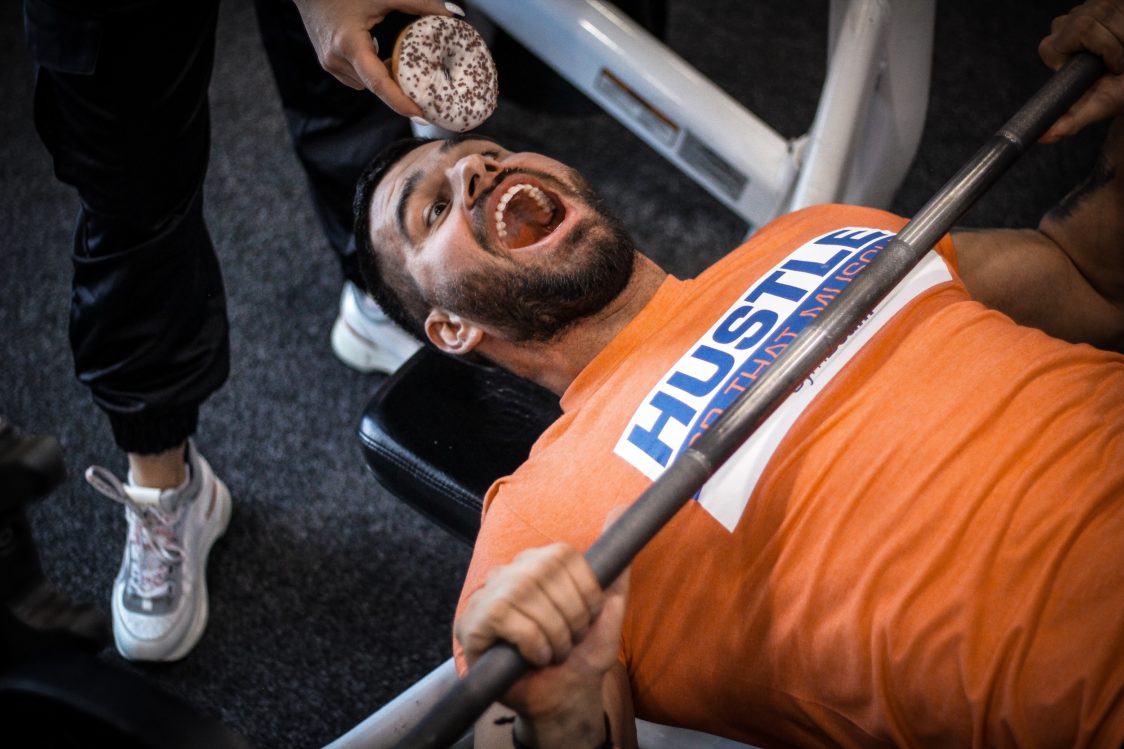Table of Contents
People’s approach to sports and exercise varies, some prefer modern fitness centers, others feel better at home. In addition to the intensity, however, the attitude to the time of training also differs. There are definitely advocates of exercising in the afternoon among you, but morning exercise has also its fans.
One of the arguments for early exercise is training on an empty stomach. It is believed that a person burns more fat and loses weight faster in the fasted state. But is it really so? Are we going to set the alarm for an earlier hour?
Morning workout burns more calories
The human body needs energy for physical activity, which is obtained from diet. More precisely, it is represented by three macronutrients – proteins, carbohydrates, and fats. Carbohydrates in the diet are a quick source of fuel because they are broken down into glucose, which travels through the bloodstream. There is also a connection with carbohydrates that the body takes energy from stored carbohydrates and fats during training on an empty stomach, and not from food that you would otherwise have just eaten. So should we all exercise in the morning before breakfast? [1] [2]
As we have already mentioned, carbohydrates are broken down into glucose, which is a source of energy. In addition, however, the body can store it in the liver and muscle tissue in the form of glycogen. It is a fast source of energy, but after a night without food, the sugar reserves in the liver are quite depleted. If the body does not have energy from available carbohydrates, it uses fat as a source of fuel. [1]

This finding is not just the result of knowing the processes in the human body. This has been confirmed by several studies, such as a 2017 study from the University of Bath. The researchers found that several genes present in fat metabolism, glucose transport, and insulin signaling “behaved differently” during exercise after a meal and on an empty stomach. Physical activity on an empty stomach triggered certain genes in obese men that were able to accelerate fat burning. According to another 2013 study, active men can burn 20% more fat on an empty stomach than after breakfast. [1] [3] [4]
What happens to the human body when we exercise on an empty stomach?
- Fat cells are broken down – lipolysis.
- Fat is used as fuel.
- Hormone levels that support the use of fat as a fuel are rising.
- Degradation of fats in the abdomen is promoted.
- Abdominal blood flow increases. [5]
Morning training on an empty stomach is better according to this, and scientists are also proving it. If it were that simple, this article would end here, everyone would exercise in the morning, and the gyms could close quietly in the afternoon. However, the whole topic is a bit more complex.

Exercising on an empty stomach is great, but …
Some people exercise in the morning because they prefer to “get it over with” before work, others want to mainly lose weight more quickly. Before you go for a run or lift dumbbells before sunrise, you should consider a few interesting findings.
Fasted training is beneficial in terms of increase of the growth hormone and insulin sensitivity. These processes can result in fat loss, but keep in mind the following two facts:
- Intense fasted training can have an impact on your muscles – this is the catch you may have been waiting for. During a demanding morning workout before breakfast, muscle loss can occur because the body can break down amino acids to maintain blood glucose levels. During a fast run or demanding strength training, more glycogen is used than fat, and it doesn’t matter if you have an empty stomach. This is also proved by a study by Schoenefeld from 2011, which will be of particular interest to bodybuilders and athletes interested in gaining muscle mass. Fasted training significantly affects the protein stores that you have gained through diet and exercise. It can cause their loss by up to 10.4%. [6] [7] [14]
- We burn glucose and fat throughout all day – remember that the amount of fuel from glucose, or fat, depends on all energy “requirements” throughout the day. However, fat burning is more about total energy expenditure. Yes, you can burn a little more fat by training on an empty stomach, but from an overall point of view, it probably won’t be enough to solve the problematic fat. [6]

Are you really interested in daily energy expenditure? To learn more about it and its calculation, read our article – How to Calculate Basal Metabolic Rate and Daily Energy Consumption?
Common truths and rules without relevant evidence become only “hypotheses”. It is up to the research to analyze and validate theories that “logically” make sense. Training on an empty stomach triggers other genes in obese people, but exercise before breakfast may not be a universal guide to fat reduction for everyone.
You might be interested in these products:
Evidence of this is also the results of research from 2014, which examined the hypothesis of the effectiveness of fasted exercise. The aim of the researchers was to compare the differences in fat and “non-fat” tissue of young women after aerobic training on an empty stomach or after a meal. [3] [8]
Participants were randomly divided into “fasted” and “after meal” groups. It should be noted that all respondents followed the diet plan and were in calorie deficit. Weight and adipose tissue loss were found in both groups. Are you wondering how much better the group that trained on an empty stomach was? According to the results, there were no significant differences between the groups. It is true that only young women were involved in the research and their number was also not particularly high (20 respondents). On the other hand, it can mean that if you follow a reasonable diet and exercise, it doesn’t matter if you go jogging before or after breakfast. [3] [8]

Less strength during exercise
Another argument against fasted trainings is less strength during exercise. Using fat as energy requires more oxygen, so breaking down fat takes longer compared to carbohydrates. To maintain a high intensity, the “rate” of fat metabolism is slow. This means that your training may be weaker than if you had eaten before. [1]
The evidence is the results of a study from 2019, which compared the performance of squats and bench presses after a carbohydrate-rich breakfast and “water only” breakfast. The task of the participants was to perform 4 series of squats and bench presses at the level of 90% of their maximum for 10 repetitions (10 RM – repetition maximum). The result? Participants who drank only water in the morning and did not have breakfast had a 15% reduction in squatting strength and a 6% reduction in bench press. The results show that training associated with lifting higher weights or requiring strength is probably more sensible and effective after a meal. It is possible that you will burn more fat, but your performance may “go down”, which you probably will not like emotionally, and in addition you are at risk of injury due to fatigue. [9] [10]
Sudden drop in energy (“The Bonk”)
There is another risk associated with training before breakfast, which is related to glycogen supply. In English, it is known as The Bonk or “hitting the wall”. Energy loss occurs due to the depletion of glycogen stores. Complete “Bonk” occurs when glycogen is completely depleted of muscle and liver. [11]
The glycogen stored in the liver is depleted after a hard workout or night. Remember the fact that not only your muscles need energy, but also your brain. When you are in a fasted state, the source of energy for the brain is glycogen in the liver. Therefore, exercising on an empty stomach runs the risk of a decrease in energy, which can cause a lack of glycogen in the muscles, but also little “fuel” supplied to the brain. [1]
How to prevent a sudden drop in energy?
On the other hand, it is true that severe glycogen loss occurs during longer endurance activities rather than during short and intense trainings. You can logically prevent a drop in energy by consuming carbohydrates and replenishing glycogen stores, especially after a long workout lasting an hour or more. An important fact is that chronic malnutrition may also be behind glycogen depletion. Therefore, if you are considering exercising on an empty stomach, keep in mind your “glyco-supplies”, depletion of which you can really feel. So it depends on the intensity and type of training you prefer. [1] [11]
If, despite the disadvantages of fasted trainings, you are determined to keep on doing it, let us at least give you two tips [12]:
- Do not train only on an empty stomach – this method of exercise is only suitable if it is low in intensity. It is therefore not recommended to exercise more than twice a week before breakfast. So if you exercise at least four times a week, try to balance it. Leave your stomach empty for less demanding workouts, and you should replenish your energy from the diet before the intense ones.
- Think about proteins and carbohydrates after training – exercise puts the body under stress and it needs nutrients to regenerate after training. Therefore, give your body not only carbohydrates but also proteins after training.

What to eat before training?
The aim of the article is not to convince you of consuming food before exercise, but rather to point out its advantages and disadvantages. You know your body most and you know what works best for it. Do you prefer to eat before training, or you decided to combine it? In this chapter we will try to recommend what and when to eat before, but also after exercising.
Eating something before going to the gym has several advantages [7]:
- It will increase the strength and intensity of your trainings
- It will support the regeneration of the organism
- It will ensure a longer and more pleasant exercise
Your pre-workout meal should primarily provide energy for exercise, while not straining your stomach. If you are going to exercise in an hour, choose an easily digestible snack rich mainly in carbohydrates.
For the best exercise results, it is advisable to consume a meal containing carbohydrates, proteins, and fats, but you have to give your digestion more time for that – about 2 – 3 hours. [13] Has it ever happened to you that your stomach needed a little more time after coming to the gym?
For a better overview and selection of the right food, we offer you several examples according to the time before training:
- If you have an hour or less before exercise – fruit, protein bar or Greek yogurt with fruit
- If you have 2 hours before exercise – protein drink, porridge, whole grain cereals with milk
- If you have 2-3 hours before exercise – a dietary source of protein with brown rice and roasted vegetables, a wholemeal sandwich with protein and salad, an omelette with wholemeal toast [13]

Are you seeking some inspiration for a healthy and nutritious breakfast before training? In the article you will find up to 20 tips on how to enrich your first morning meal – 20 breakfast tips you can eat before training.
The best way to support your performance during training is with a balanced diet. When compiling your diet, you should focus on [2]:
- proteins from meat, eggs, and dairy products,
- healthy carbohydrates from fruits, vegetables, legumes, and whole grains,
- healthy fats from coconut or olive oil, alternatively ghi,
- various nutrient-rich nuts and seeds, such as almonds,
- nutritious and unprocessed foods.

Whether you choose to train on an empty stomach or eat something small before it, morning training has several other benefits in addition to fat burning. Interesting and inspiring reasons why not to leave exercising in the afternoon or evening can be found in the article – 9 reasons to exercise in the morning.
Exercising on an empty stomach can be beneficial, but according to research, probably not in the same extent for everyone. In the article, we have provided you with his “pros and cons”, as well as the results of research that has addressed this topic. The most important thing is that your training suits you and does not cause you any health problems or slow down your fitness goals. Whether you decide to eat something before exercise or not, we believe that we have broadened your horizons again.
Would you like your friends to learn about fasted training too? Feel free to support the article by sharing.
[1] Abe Ankers – WORKING OUT IN THE MORNING: SHOULD I EXERCISE ON AN EMPTY STOMACH? – https://www.runtastic.com/blog/en/morning-workouts-empty-stomach/
[2] Emily Cronkleton – Is It Safe to Work Out on an Empty Stomach? – https://www.healthline.com/health/fitness-exercise/working-out-on-an-empty-stomach
[3] Is Working Out on an Empty Stomach a Good Idea? – https://www.mensjournal.com/health-fitness/should-you-work-out-empty-stomach/
[4] Yung-Chih Chen, Rebecca L. Travers, Jean-Philippe Walhin, Javier T. Gonzalez, Francoise Koumanov, James A. Betts, Dylan Thompson – https://journals.physiology.org/doi/full/10.1152/ajpendo.00006.2017
[5] Should I Work Out On An Empty Stomach? – https://www.kaylaitsines.com/blogs/education/working-out-on-an-empty-stomach
[6] Paul Rogers – Weight Training on an Empty Stomach for Fat Loss – https://www.verywellfit.com/weight-training-fat-loss-3969252#citation-2
[7] Paige Waehner – Exercising on an Empty Stomach and Fat Loss – https://www.verywellfit.com/should-you-exercise-on-an-empty-stomach-1231583
[8] Brad Jon Schoenfeld, Alan Albert Aragon, Colin D Wilborn, James W Krieger, Gul T Sonmez – Body composition changes associated with fasted versus non-fasted aerobic exercise – https://jissn.biomedcentral.com/articles/10.1186/s12970-014-0054-7
[9] CHRISTIAN FINN – Fasted Weight Training: The 5 Questions Everyone’s Asking Google – https://muscleevo.net/fasted-weight-training/
[10] Mohamed Nashrudin Bin Naharudin, Ashril Yusof, Harry Shaw, Matthew Stockton, David J Clayton, Lewis J James – https://pubmed.ncbi.nlm.nih.gov/30707135/
[11] Gale Bernhardt – Everything You Need to Know About Bonking – https://www.active.com/triathlon/articles/everything-you-need-to-know-about-bonking
[12] CATRIONA HARVEY-JENNER – Working out on an empty stomach: the 2 rules you should follow – https://www.cosmopolitan.com/uk/body/fitness-workouts/a28696448/work-out-empty-stomach-exercise/
[13] Arlene Semeco – Pre-Workout Nutrition: What to Eat Before a Workout – https://www.healthline.com/nutrition/eat-before-workout
[14] Brad Schoenfeld MS, CSCS – Does Cardio After an Overnight Fast Maximize Fat Loss? – https://journals.lww.com/nsca-scj/Fulltext/2011/02000/Does_Cardio_After_an_Overnight_Fast_Maximize_Fat.3.aspx

